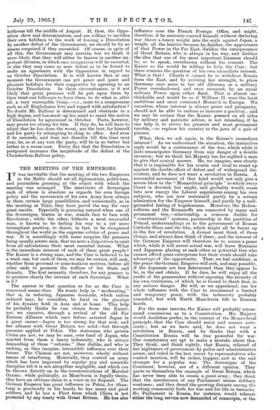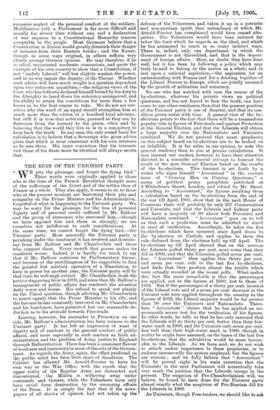THE MEETING OF THE EMPERORS.
TT was inevitable that the meeting of the two Emperors in the Baltic should set all diplomatists, politicians, and journalists guessing at the object with which the meeting was arranged. The interviews of Sovereigns each of whom is absolute as regards his own foreign policy and the movements of his own Army have always in them certain large possibilities, and occasionally, as in the meeting at Tilsit, they have paved the way for very great results. Especially is guessing natural when one of the Sovereigns, beaten in war, stands fate to face with Revolution ; while the other, hitherto a most successful man, is known to be feeling his way to a yet more triumphant position, to desire, in fact, to be recognised throughout the world as the supreme arbiter of peace and war. It is accordingly with some surprise, the guessers being usually astute men, that we note a disposition to omit from all calculations their most essential datum. What is the immediate interest of each of these great people ? The Kaiser is a strong man, and the Czar is believed to be a weak one, but each of them, we may be certain, will seek, whether from personal or conscientious motives, before all other ends to promote the welfare of his State and dynasty. The first necessity, therefore, for any guesser is to perceive clearly the interest of each Sovereign. What is it ?
The answer to that question so far as the Czar is concerned seems clear. He wants help in "moderating," that is, in reducing, Japanese demands, which unless reduced may, he considers, be fatal to the prestige of his dynasty both in Asia and at home. This help he probably thinks he can obtain from the Kaiser, not, we conceive, through a revival of the old Far Eastern Alliance which once before arrested Japan in a great career—Japan is too strong for that now, and her alliance with Great Britain too solid—but through pressure applied at Pekin. The statesmen who govern China are not, we may be sure, over fond of Japan, who exacted from them a heavy indemnity, who is always demanding of them " reforms " they dislike, and who is seeking, as they imagine, irresistible influence over their future. The Chinese are not, moreover, wholly without means of interfering. Materially, they control an army which has been improved by regular pay and scientific discipline till it is not altogether negligible, and which can be thrown directly on to the communications of Marshal Oyama ; while politically, as Manchuria is legally theirs, they have an obvious claim to a voice in its disposal. The German Emperor has great influence in Pekin, for Shan- twig is practically in his hands, he has many and good soldiers, and he has a Fleet from which China is not protected by any treaty with Great Britain. He has also influence over the French Foreign Office, and might, therefore, if he seriously exerted himself, without declaring war throw a heavy weight into the scale against Japan, a weight all the heavier because he dislikes the appearance of that Power in the Far East, dislikes the omnipresence of Great Britain, who is always in his way, and dislikes the idea that one of his most important kinsmen should be, so to speak, overthrown without his consent. The Kaiser so far would be willing to help the Czar ; but there remains the question of his own immediate interest. What is that? Clearly it cannot be to withdraw Russia from the East, and by reviving her strength, to place Germany once more in her old dilemma as a military Power overshadowed, and even menaced, by an equal military Power upon either flank. That is almost un- thinkable, and would be so if William II. were the least ambitious and most contented Monarch in Europe. We ourselves, whose interest is always peace and prosperity, should not be able to endure so insecure a position ; and we may be certain that the Kaiser, pressed on all sides by military and patriotic advice, is not intending, if he can help it, to revive his greatest and most permanent trouble,—to replace his country in the jaws of a pair of pincers.
What, then, we ask again, is the Kaiser's immediate interest? As we understand the situation, the instinctive reply would be a continuance of the war, which while it lasts emancipates Germany from any danger of a double invasion ; but we think his Majesty too far-sighted a man to give that cynical answer. He, we imagine, sees clearly that it is impossible for his cousin and rival to stand up against the double effect of defeat and of widespread dis- content, and he does not want a revolution in Russia. A successful movement of that kind would not only give a, severe blow to the "Monarchical principle" to which every Court is devoted, but might, and probably would, rouse into new energy the Liberal aspirations among his own subjects, who are now restrained partly by a certain admiration for the Emperor himself, and partly by a well- grounded feeling of hopelessness. Moreover. the Hohen- zollerns and the Romanoffs are connected by many and permanent ties,—relationship, a common dislike for " constitutional " systems, partnership in the partition of Poland, understandings as to the government of Roman Catholic Slays and the like, which might all be burnt up in the fire of revolution. A dynast must think of these things, and always does think of them ; and the interest of the German Emperor will therefore be to secure a peace which, while it will arrest actual war, will leave Russians and Japanese glaring at each other as potential foes who cannot afford great enterprises lest their rivals should take advantage of the opportunity. That, we feel confident, is the peace the German Emperor will seek, and may possibly, if the Japanese are less determined than they appear to be, in the end obtain. If he does, he will enjoy all the credit of the peacemaker without exposing the security of his own territories, of which he is bound to think first, to any serious danger. He will, as we apprehend, use his whole influence with the Czar to recommend a limited and temporary peace, with the indemnity probably conceded, but with North Manchuria left in Russian hands.
For the same reasons, the Kaiser will probably recom- mend concessions as to a Constitution. His Majesty would doubtless prefer, in the interest of the Monarchical principle, that the Czar should resist and remain auto- cratic; but as we have said, he does not want a revolution in Russia, and he thinks that with a Constitution Russia will be less powerful for war. Our countrymen are apt to make a mistake about this. They think, and think rightly, that Russia, relieved of her nightmare of government by police and administrative arrest, and ruled in the last resort by representatives who control taxation, will be richer, happier, and in the end stronger for a popular war. The Sovereigns of the Continent, however, are of a different opinion. They quote to themselves the example of Great Britain, which has never been able to create a great army ; they think that the interference of any Parliament means military weakness; and they dread the growing distaste among the working community both for war and for life in barracks. No Parliament in Russia, for instance, would tolerate either the long service now demanded of conscripts, or the excessive neglect of the personal comfort of the soldiery. Mobilisation with a Parliament is far more difficult and usually far slower than without one, and a declaration of war requires in a Constitutional Monarchy reasons acceptable to the people. Most Germans believe that a Constitution in Russia would greatly diminish their danger of invasion from their Eastern border ; and the Kaiser, though in some ways original, in others reflects very closely average German opinion. He may therefore, if he is asked, recommend moderate concessions, and quote the example of his own country to show that a Constitution, if not "unduly Liberal," will but slightly weaken the power, and in no way impair the dignity, of the Throne. Whether such advice will have much weight is a question dependent upon two unknown quantities,—the religious views of the Czar, who has hitherto declared himself bound by his duty to the Almighty to hand down his autocracy unimpaired, and his ability to retain his convictions for more than a few hours as to the best course to take. We do not see our- selves why the word of an equal should strengthen him so much more than the advice of a hundred loyal advisers ; but still it is true that autocrats, pursued as they are by flatterers from the nursery to the grave, often end by believing that the world they live in is in a conspiracy to keep back the truth. In any case, the only sound basis for calculation is to believe that a Sovereign who gives advice gives that which is most consistent with his own interests as he sees them. His inner conviction that his interests and those of his State must be identical will always secure that.







































 Previous page
Previous page